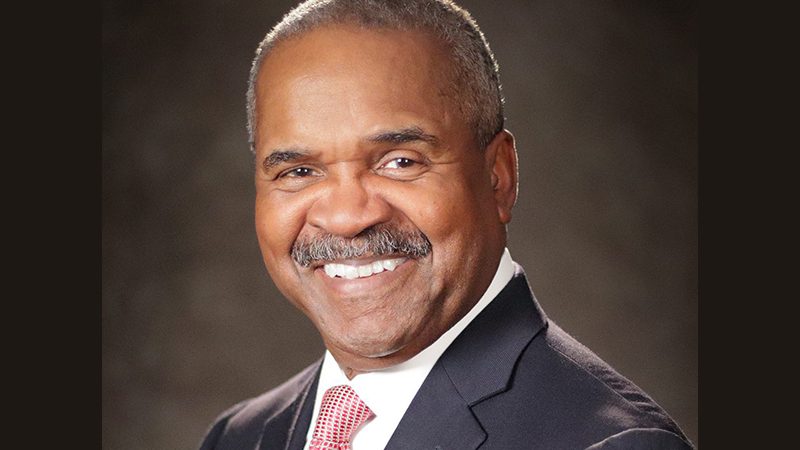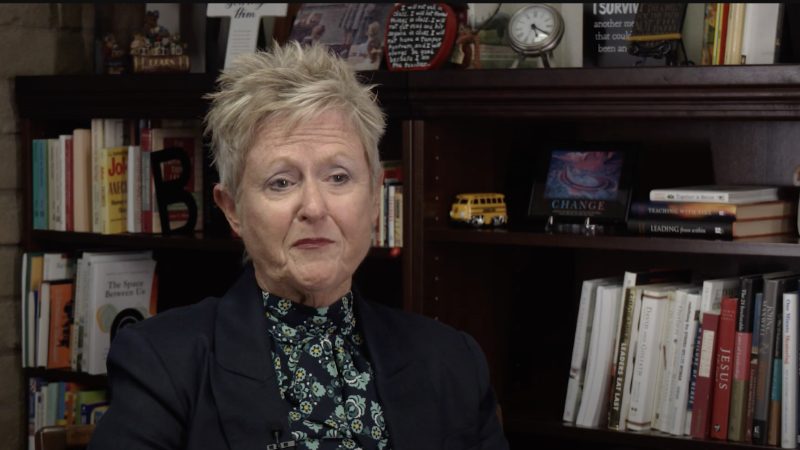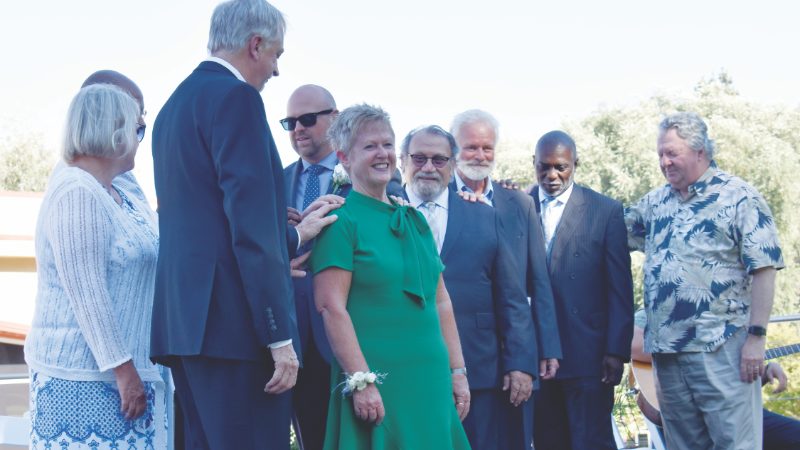
In 2023, Western Adventist Foundation (WAF) distributed $8,751,694.51 to Adventist charities. Nearly $4M of that was through charitable gift annuities. Another $600K was from estates, $3.6M from trusts, and the remaining half million from charitable remainder and other trusts.
Organizations that often benefit from the trusts WAF manages include Adventist conferences, unions, and educational institutions, as well as church ministries such as Adventist Development and Relief Agency (ADRA), Adventist World Radio, Amazing Facts, It Is Written, and Maranatha Volunteers International, among many others.
“Today we serve over 80% of the entire church,” said Jim Brown, president of WAF.
WAF is a non-profit trust management and estate planning organization, founded by the Pacific Union in 1997.
“The president at the time wanted to build a foundation with technical experts in planned giving and trust management,” Brown explained. “He wanted to help the church do a better job, with a vision of excellence. He wanted to fill the foundation with people who knew what they were doing and were doing it well.”
Which is exactly what happened. Today, nearly 30 years later, WAF’s employees are highly educated and experienced in finance, wealth management, business administration, and other related fields. And they use that education and experience to help church members support their favorite church ministries and organizations.
The challenge, Brown said, is reaching the under-50 crowd.
“Most people under 50 don’t understand how the trust department can benefit them,” he said. “The older generation knows it benefits them and benefits the church, and it’s a slam dunk. What I’m trying to do is educate younger people on how charitable remainder trusts can help them manage their wealth much more effectively.”
The word “wealth” may be part of the issue, Brown admitted. Often there is a misconception that in order to invest or manage your money you have to have a lot of it. But Brown said that isn’t true.
“I can work with anyone,” he said. “Let’s talk about where you’re at, what your resources are, and what you want to do to provide a better income source for yourself now and give a gift to the church and your family in the end.”
Brown said his clients select their trust’s beneficiaries based on their own personal interests and because they believe in the mission of an organization. This is an approach younger generations—specifically millennials, who are known for their altruism—can support fully.
“A major portion of the money we distribute is going toward making the world a better place,” Brown said. “What better way to invest could there be?”
WAF has seen a 15% growth in maturity annually for the past several years, as they continue to increase their client base, which also increases their reach as far as which organizations receive funds and the amount they receive. At some point, though, Brown points out, that average will decline as the majority of trustors age and pass away.
“We are focusing intently on education and raising awareness of who we are and how we serve the church, its ministries, and its members,” he said, “particularly amongst the younger generations.”
Brown travels regularly to present seminars and lead workshops on charitable trusts and wealth management. He has been interviewed on TV and mentors young people in financial literacy. The foundation’s efforts seem to be successful—at the most recent seminars the median age of attendees was in their 30s, which was encouraging to Brown and his team.
“WAF was organized and designed to support the church in its entirety,” he said. “We receive no benefit from the documents we manage; we are simply here to serve the church. People don’t need to know a lot to start a charitable trust, they just need to have a desire to support the church in whatever capacity sparks their interest. WAF makes it easy to improve personal finances, the church, and the world.”
Nearly $9 million distributed to church entities in 2023 says it all.
To invite Brown to offer a seminar at your church or organization, or to learn more about how you can support the church or a ministry through a charitable trust, contact the foundation at 866-356-5595 or info@wafsda.org.
____________________
By Becky St. Clair
Organizaciones de beneficiencia reciben $9 millones en 2023 a través de fideicomisarios
En 2023, Western Adventist Foundation (WAF) distribuyó $8,751,694.51 a organizaciones de beneficencia adventistas. Casi 4 millones de dólares de esa cantidad fueron a través de anualidades de donaciones caritativas. Otros 600 mil dólares procedían de patrimonios, 3,6 millones de dólares de fideicomisos y el medio millón restante de fideicomisos benéficos.
Las organizaciones que a menudo se benefician de los fideicomisos que administra WAF incluye asociaciones adventistas, uniones e instituciones educativas, lo mismo que ministerios tales como la Agencia de Desarrollo y Recursos Asistenciales (ADRA), Amazing Facts, It Is Written y Maranatha Volunteers International, entre muchos otros.
«Servimos a más del 80% de la iglesia», dijo Jim Brown, presidente de WAF.
WAF es una organización sin fines de lucro para administración de fideicomisos y planificación patrimonial, fundada por Pacific Union Conference en 1997.
«El presidente en ese momento quería establecer una base con técnicos expertos en donaciones planificadas y gestión de fideicomisos», explicó Brown. «Quería ayudar a la iglesia a hacer un mejor trabajo, con una visión de excelencia. Quería llenar la fundación con gente que supiese lo que estaba haciendo y lo estuviese haciendo bien».
Eso es exactamente lo que sucedió. Casi 30 años después, los empleados de WAF tienen un alto nivel educativo y experiencia en finanzas, gestión de patrimonios, administración de empresas y otros campos relacionados. Usan esa educación y experiencia para ayudar a los miembros de iglesia a apoyar sus ministerios y organizaciones de la iglesia.
El desafío, dijo Brown, es llegar a los menores de 50 años.
«La mayoría de las personas menores de 50 años no entienden cómo el departamento de fideicomiso puede beneficiarlos», dijo. «La generación mayor sabe que los beneficia y beneficia a la iglesia, y es un golpe de efecto. Lo que estoy tratando de hacer es educar a los más jóvenes sobre cómo los fideicomisos caritativos pueden ayudarlos a administrar su patrimonio de manera mucho más efectiva».
La palabra «patrimonio» puede ser parte del problema, admitió Brown. A menudo existe la idea errónea de que para invertir o administrar su dinero se debe tener mucho. Pero Brown dijo que eso no es cierto.
«Puedo trabajar con cualquiera», dijo. «Hablemos de dónde estás, cuáles son tus recursos y qué quieres hacer para proporcionarte una mejor fuente de ingresos y dar un regalo a la iglesia y a tu familia al final».
Brown dijo que sus clientes seleccionan a los beneficiarios de su fideicomiso en función de sus intereses personales y porque creen en la misión de una organización. Ese es un enfoque que las generaciones más jóvenes, específicamente los millennials, que son conocidos por su altruismo, pueden apoyar plenamente.
«Una parte importante del dinero que distribuimos se destina a hacer del mundo un lugar mejor», dijo Brown. «¿Qué mejor manera de invertir podría haber?»
WAF ha experimentado un crecimiento anual del 15% en vencimientos durante los últimos años, a medida que continúan aumentando su base de clientes, lo que también aumenta su alcance en cuanto a qué organizaciones reciben fondos y la cantidad que reciben. Sin embargo, en algún momento, señala Brown, ese promedio disminuirá a medida que la mayoría de los fideicomitentes envejezcan y fallezcan.
«Nos estamos enfocando intensamente en la educación y en crear consciencia de quiénes somos y cómo servimos a la iglesia, sus ministerios y sus miembros», dijo, «particularmente entre las generaciones más jóvenes».
Brown viaja regularmente para presentar seminarios y dirigir talleres sobre fideicomisos benéficos y gestión de patrimonios. Ha sido entrevistado en televisión y es mentor de jóvenes en educación financiera. Los esfuerzos de la fundación parecen tener éxito: en los seminarios más recientes, la edad promedio de los asistentes era de 30 años, lo que fue alentador para Brown y su equipo.
«WAF fue organizada y diseñada para apoyar a la iglesia en su totalidad», dijo. «No recibimos ningún beneficio de los documentos que manejamos; Simplemente estamos aquí para servir a la iglesia. Las personas no necesitan saber mucho para iniciar un fideicomiso caritativo, solo necesitan tener el deseo de apoyar a la iglesia en cualquier capacidad que despierte su interés. WAF hace que sea fácil mejorar las finanzas personales, a la iglesia y al mundo».
Casi $9 millones distribuidos a entidades adventistas en 2023 lo dicen todo.
Para invitar a Brown a ofrecer un seminario en su iglesia u organización, o para obtener más información sobre cómo puede apoyar a la iglesia o a un ministerio a través de un fideicomiso caritativo, comuníquese con la fundación al 866-356-5595 o info@wafsda.org.
____________________
Por Becky St. Clair







